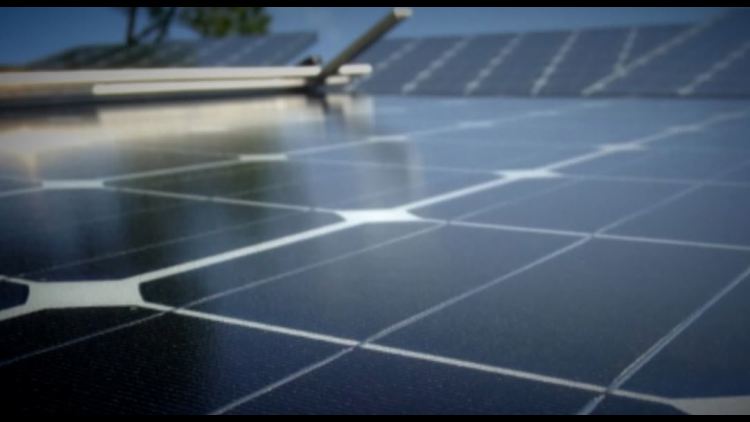NEW ORLEANS -- A new and controversial economic study predicts that most utility companies in the state will soon be able to deny net-metering to new solar customers – a crucial program that allows homeowners with rooftop solar panels to produce electricity during the day, put it on the grid and then use it later at no charge.
The news comes just as the state's solar industry faces another devastating cut: the likely early end of the state's solar tax credits.
A draft of the economic study by David Dismukes of Acadian Consulting finds that the state's generous 50-percent tax credit for installing new solar panels has cost at least $89 million more than the benefits created by a nascent solar panel industry that employs 1,200 Louisiana residents.
The solar industry complained that Dismukes' study misses the mark of what it was supposed to evaluate.
"This study is a blatant attempt to undermine the rights of Louisiana residents and to prevent the growth of the solar industry," said Barry Goldwater Jr., a former congressman, the son of the 1964 GOP presidential nominee and the co-chairman of the West Coast solar advocacy group Tell Utilities Solar won't be Killed.
Instead of analyzing what impact net-metering has on the utility transmission and energy production costs, the report focuses on the costs of the tax credits, said Jeff Cantin, president of the Gulf States Renewable Energy Industries Association.
Solar companies and their advocates have long questioned the neutrality of Dismukes, a Louisiana State University economist who has done work for utility companies and the oil and gas industry. As expected, his report found the solar industry tax credits were essentially a boondoggle in which the costs to Louisiana ratepayers and taxpayers far outpaced the benefits of about 18,000 rooftop solar customers.
But what wasn't expected was the way the report was released. A draft of the report was sent out in an email to legislators by Eric Skrmetta, a commissioner who was narrowly reelected last fall against solar advocate Forest Bradley-Wright.
The solar industry poured big money into trying to unseat Skrmetta, and the monopoly utility companies gave just as much to try to keep him in place. If Bradley-Wright had won, it would have shifted the balance of power on the commission in favor of four commissioners who have, at least at times, supported alternative energy initiatives.
Skrmetta's email to legislators Tuesday reads like a literary victory dance. He told legislators that the Dismukes report "demonstrates that Louisiana has lost <-$89,0000,000.00> (net present value) due to the impact of solar subsidies."
He also crowed that he led the charge to protect Louisiana ratepayers from the losses by imposing a cap on solar net-metering, cutting off "solar installations at 0.5% of each of the utility company's total number of consumer clients."
That's not actually the rule that Skrmetta helped impose. The rule actually applies to the amount of energy produced by solar, not the number of installations. It allows utilities to shut off any further net-metering when the use of solar power reaches 0.5 percent of each utility's peak-load capacity.
Skrmetta's letter to legislators also incorrectly claims that the Public Service Commission staff determined that all of the utility companies regulated by the PSC would hit their 0.5-percent cap by the end of July. PSC spokesman Colby Cook said Skrmetta "may have been giving his opinion" because, while Dismukes' study actually predicts that the larger utilities would hit the cap this year or should have already reached it, it also found that Entergy Gulf States won't get there until 2020.
But the gist of Skrmetta's letter is clear: The solar subsidies have made the panels quite popular and the costs of the subsidies need to be addressed by the Legislature before the Public Service Commission should even think of removing the cap.
Cantin took the letter to be a blatant invitation to the Legislature to cut the tax credit program immediately.
"It seems very vindictive on the part of Commissioner Skrmetta," he said. "It seems deliberately designed to disrupt any chances of solar being given any fair chance with the Legislature."
The Legislature voted last year to have the state's 50-percent tax credit sunset by 2017. But it's on the chopping block earlier now that Gov. Bobby Jindal has targeted it to help fill the state's $1.6 billion budget deficit. His plan would shave $57 million from the subsidies by the middle of 2016.
Skrmetta said in an interview that he didn't advocate for one course of legislative action over another, but preferred to let the Dismukes report speak for itself.
"The legislators have to determine should the credits expire under the current subset provisions or should they both expire this year or should they expire immediately," he explained.
Skrmetta said the commission would allow net-metering to continue in some form if the subsidies are eliminated. But even then, he said solar customers would no longer be able to have free use of the electricity they put out onto the grid. In the past, Skrmetta has suggested that rooftop solar panel owners should be paid a lower wholesale rate of around 4 cents per kilowatt-hour for the electricity they produce and put on the grid, and then have to pay full retail rates of about 7 cents per kilowatt-hour for anything they draw off the grid.
"Let's say the tax credits are removed," Skrmetta said. "Well, we'll lift the cap and we will be dealing with what the right rate structure needs to be, because all parties have indicated that the rate structure in place is not sustainable."
Editor's Note: An earlier version of this story incorrectly said the Dismukes study was released by Skrmetta before it was published. A copy of the report was actually posted on the Public Service Commission website on Feb. 27.



